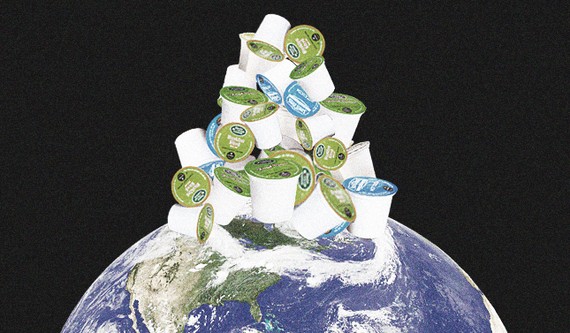The Kost of Keurig
Oh, sweet coffee, how we adore thee. There’s almost nothing better than that fresh cup of joe in the morning to get you going. Pop a coffee pod into the Keurig, and you’re on your way, right? Not exactly. Unfortunately, these single-serve cups are wreaking havoc on wallets and the environment.
According to the Washington Post, Keurig Green Mountain dominates the market for coffee pods and coffee pod machines in the United States, but sales are quickly plummeting. The company recently announced its sixth straight quarter of declining sales this year, despite their extreme popularity between 2011 and 2013. The coffee pods are non-biodegradable, which means the plastic goes straight to a landfill. In fact, 9 billion K-cups ended up in landfills last year. Keurig also produced more than 8.3 billion non-disposable cups in 2013, enough pods to wrap around the equator 10.5 times. That’s a lot of K-cups.

Since its release, biodegradable versions of the K-pod have come forth, such as Ekobrew and San Francisco Bay OneCup. Environmentally conscious consumers appreciated their compatibility with the Keurig machine. As a result, Keurig thought it would be a good idea to launch the Keurig 2.0 in 2014, a machine that only works with company-approved pods. Needless to say, it wasn’t one of their best ideas, and now they’re paying for their mistake. Consequently, Keurig’s sales dropped by 22 percent within the first three months of 2015.
Naturally, activists are speaking out about Keurig’s insensitivity toward the environment. A campaign called “Kill the K-Cup” produced a “Cloverfield“-esque video that dramatically emphasizes the negative impact of plastic coffee pods, and you can watch it here.
Now cue damage control. Keurig’s public relations team swooped in, pledging their commitment to sustainability. They consider it a “critical priority,” and promise to have a completely recyclable K-cup pack by 2020. By that rate, it doesn’t sound like Keurig is in a big rush. The creator of Keurig himself, John Sylvan, told The Atlantic how wasteful the Keurig concept is. “No matter what they say about recycling, those things will never be recyclable,” he admits. Ironically, Sylvan doesn’t even own a Keurig machine.
Lastly, let’s not forget the large dent that Keurig makes on your money. The average American drinks about 2.1 cups of coffee a day, spending approximately $190 per year for regular house blend coffee. The Keurig, however, costs four times as much at a whopping $800 per year. Financially and environmentally speaking, the Keurig just doesn’t make sense.